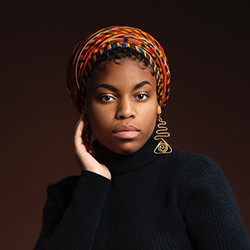Seven CFA Students Present at 2020 President’s Showcase of Undergraduate Research

On November 19, FSU celebrates outstanding undergraduate research in its 2020 President’s Showcase of Undergraduate Research. This year, seven students from the CFA family are presenting on topics related to the arts – Myah Freeman, Cole Hancock, Yadriel Hernandez Allende, Elizabeth Slade, Lilliana Reinoso, Ariel Raskin, and Rosalind Helsinger.
Sponsored by FSU’s Office of the President and the Center for Undergraduate Research and Academic Engagement (CRE), this event serves as the culmination of the IDEA Grant, Tech Fellows, and iGEM summer awards, but the work these students present tonight does not end here. Many of the award recipients will continue their intellectual pursuits through honors theses, independent study projects, graduate research, and entrepreneurial and creative work, both here on our campus and beyond.

November 19 – 5:30-6:30pm
Room Three – Click here for Zoom Link
Myah Freeman, Project Title: “Nostalgia: Freeman”
Major: BFA Studio Art, Faculty Mentor: Dr. Carrie Ann Baade
Cole Hancock, Project Title: “Traditional Craft and the Human Impact on Natural Spaces”
Major: BFA Studio Art, Faculty Mentor: Dr. Denise Bookwalter
Yadriel Hernandez Allende, Project Title: “Fragmenting the New Nomad: A Visual Showcase Exploring Identity within the Puerto Rican Diaspora”
Major: BFA Studio Art, Faculty Mentor: Rob Duarte
November 19 – 6:45pm – 7:45pm
Room Two – Click here for Zoom Link
Rosalind Helsinger, Project Title: “False Flesh: Shakespeare and Adultery”
Major: BA Creative Writing, Faculty Mentor: Dr. Terri Bourus
November 19 – 6:45pm – 7:45pm
Room Three – Click here for Zoom Link
Elizabeth Slade, Project Title: “Theatre Congregation: Breaking Down the Bicameral Relationship Between Actor and Audience”
Major: BA Theatre, Faculty Mentor: Dr. Kris Salata
Lilliana Reinoso, Project Title: “For Your AI’s Only: Exposing the Nipple Ban”
Major: BFA Studio Art/Pre-Medical, Faculty Mentor: Dr. Grant Mandarino
Ariel Raskin, Project Title: “Can You Hear Me?”
Major: BFA Studio Art, Faculty Mentor: Jessica Ingram
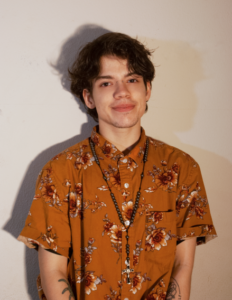 YADRIEL HERNANDEZ ALLENDE
YADRIEL HERNANDEZ ALLENDE
Supervising Professor: Prof. Robert Duarte
Fragmenting the New Nomad: A Visual Showcase Exploring Identity within the Puerto Rican Diaspora
Yadriel Hernandez Allende is currently a BFA student in the Department of Fine Arts, and intends to continue scholarly research through the International Visual Sociology Association as they matriculate into the Department of Art Education, hoping to work with museum collections centering on Latinx Art.
Abstract: Through the integration of qualitative methodology–such as photo-elicitation, journal responses, and interviews–this study collaborates with participants over a two-week period to document, reflect, and discuss their perceptions and relationships to place, memory, and belonging. These conversations–made available online as blogpost entries along with supplemental materials including an extended prompt list, discussion section–trace generational and personal displacement from ‘place of origin’ through the documentation of real space as sacred to the extent of which they can reflect where our own nostalgia lies. Although documentation of the Puerto Rican ‘new nomad’ was of primary interest, I felt it was necessary to acknowledge the vast realities present in the transnational identities of a diaspora should audiences have little to no prior knowledge. Thus, individuals residing in (or originating from) the same geographical “melting pots” were included.
MYAH FREEMAN
Supervising Professor: Prof. Carrie Ann Baade
Nostalgia: Freeman
Myah Freeman is a Senior majoring in the Bachelor of Fine Arts Program. In 2019, she served as an FSU Global Scholar, conducting research on the talibé children in Senegal. Her previous awards include this year’s FSU President’s Humanitarian of the Year Award, the Benjamin A. Gilman Scholarship, and the Ada Belle Winthrop-King Visual Arts Endowment. Myah’s career goals include working in creative design alongside her business where she uses art as advocacy.
Abstract: Returning to 1619, the enslavement of Africans began in the Western World, causing years of generational scarring and loss of origin for African Americans. The topic of Black genealogy must be approached differently due to this very history, making it difficult to trace our ancestors. Many of their names went undocumented under the ownership of their slave masters. Ancestry is important as it aids in helping us understand our full identity and purpose of being. My research project consists of using genealogical databases and assistance from the National Museum of African American History and Culture’s Robert Frederic Center to unveil my very own story. I have been able to trace parts of my family back to the year of Emancipation Proclamation in 1863 by accessing hundreds of records including censuses, marriage, and death certificates. My research aims to educate my community, serving as a blueprint on how to go about such a task themselves. As a result, I have created a body of mixed media work, honoring and representing my story.
 ROSALIND HELSINGER
ROSALIND HELSINGER
Supervising Professor: Dr. Terri Bourus
False Flesh: Shakespeare and Adultery
Rosalind is a Senior majoring in Creative Writing. She is currently applying to graduate schools both inside and outside the country to become a professor of Creative Writing. Her work has been published by YouthPlays and the Evening Street Review.
Abstract: My Honors Thesis explores the nuances of Shakespeare’s adulteresses, focusing on both the women who do commit adultery and the false adulteresses, who are innocent women accused of adultery by their husband or fiancé. The unifying thread of these plays showcases how the societal power of adultery, and the accusation of it, shaped the identity of Elizabethan women, with adultery being fused into their purity. My research argues that the trope of the adulteress, whether they are guilty or not, increases the dramatic stakes because chastity was considered the core identity for women. The Elizabethan era conflation of chastity and life for women meant that an accusation of adultery would cost a woman not only all her societal power and position, but also her voice and identity as a woman. This great potential loss serves as a theatrical device to elevate the stakes and as a lens to explore societal and gender power dynamics throughout the Shakespeare canon.
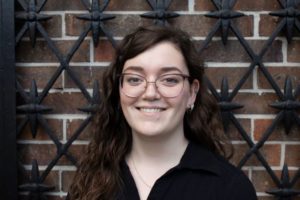 COLE HANCOCK
COLE HANCOCK
Supervising Professor: Prof. Denise Bookwalter
An Observation of the Preservation Compromise: The Adaptation and Alteration of Nature to Meet Visitor Demands
Cole Hancock is a Senior working toward her BFA at Florida State
University, where she is also co-director of Phyllis Straus Gallery.
She has been in a number of art shows, including HSF Excellence
in the Visual Arts Exhibition locally at FSU, curated a number more,
and has won a number of awards within the art department. Her work focuses on the Anthropocene and leans on traditional craft techniques in paint, print, photography, and book art.
Abstract: As humans become the dominant species on the planet, nature is shunted aside, but for the areas we try to
preserve, where people and nature compromise on existence, the space becomes fundamentally altered. I am
documenting the interaction and effect of visitors to such places by observing local parks in Tallahassee, with a focus on how the volume of visitors might affect the general upkeep of the individual parks. This summer was spent obtaining observational data of visitors, evidence of their presence (trash and forgotten items), and local flora and fauna. The ultimate goal of this project is the creation of five artist books with paper I make that incorporates the natural vegetation and the refuse of five corresponding locations. Each unique book and its paper will be designed and made with its respective park in mind, which will then be filled with sketches from the park that draw attention to the interactions of visitors as well as text instructing the reader on how to consider the park. The intent is to pique visitors’ awareness of their own impact, as well as that of the greater community, on local environments and how each has adapted to occupying the same space.
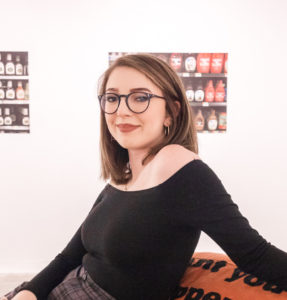 ARIEL RASKIN
ARIEL RASKIN
Supervising Professor: Prof. Jessica Ingram
Can You Hear Me?
Ariel is a BFA Studio Art major graduating this December. All of her work has been about cultivating vulnerability through the use of text. She has been awarded the BFA award, as well as the Excellence in Visual Arts award. Her future goals are to attend graduate school and receive her MFA in Studio Art..
Abstract: After losing an important person to me last fall, everything I thought of always brought me back to her and the loss that never goes away. I am constantly grieving. Everywhere I go, it follows me, and for a while it felt like I was the only one in the world that could feel this immense loss. After the pandemic began, peoples’ loved ones began to die everywhere, in mass amounts and in the public eye. Not only was death becoming a prominent topic, but fear to lose those we love was as well. As I watched this unfold, I realized that no one was talking about what comes after death. Grief was everywhere, and still is, in immeasurable amounts, but is not being talked about. By opening up to the public with my own traumatic experiences dealing with death and loss, I am trying to start a conversation about grief. For those who are left behind, I want them to know that others are also lingering in the space between moving forward and yearning for the past.
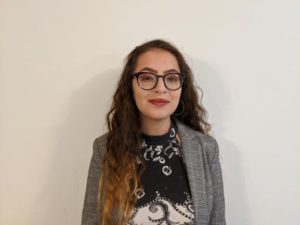 LILLIANA REINOSO
LILLIANA REINOSO
Supervising Professor: Dr. Grant Mandarino
For Your AI’s Only: Exposing the Nipple Ban
Lilliana is a Junior Studio Art major simultaneously pursuing studies in Pre-Law. She has previously been engaged in DIS research assisting in studies regarding the Interpersonal Theory of Suicide. Lilliana endeavors to implement the knowledge of her dual academic interests
to pursue Cultural Property law.
Abstract: As social media has proliferated, various companies such as Instagram have implemented artificial intelligence to perform high-speed content moderation in real time. This mode of content moderation exacerbates the discriminatory nature of Instagram’s community guidelines regarding “female” nipples. The policy and its implementation are problematic in various ways. Firstly, the ban on “female” nipples implies that the female body is inappropriate or harmful. Secondly, the classification of “female” that the platform relies upon is inherently transphobic and Eurocentric. Consequently, Instagram ends up classifying “female” bodies in negative terms while reinforcing regressive ideas of who is and is not “female.”
Throughout the project, it became apparent that not all nipples were treated equally. The chests of those who appeared white (either naturally or via editing) tended to be removed more quickly than those of their black/brown skinned counterparts. In attempts to evade AI censorship, I experimented with pattern, abstraction, and color. While these attempts were not always successful, it was curious to see how certain means of evasion became ineffective as time progressed, implying artificial learning or the widening of AI search parameters.
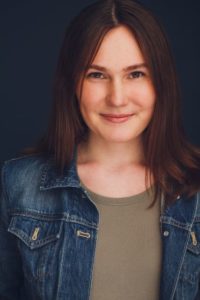 ELIZABETH SLADE
ELIZABETH SLADE
Supervising Professor: Dr. Kris Salata
Theatre Congregation: Breaking Down the Bicameral Relationship Between Actor and Audience
Beth Slade is a Senior pursuing a BA in Theatre and will be graduating with dual honors this spring. Beth has performed in many productions at FSU and looks forward to continuing to perform professionally. She would like to thank Dr. Kris Salata for always supporting her artistic endeavors.
Abstract: Based on the practitioner, Jerzy Grotowski, I wanted to make a space in which actors and audiences could congregate and engage with one another, what I deemed a “Theatre Congregation.” This is to be accomplished by utilizing the technique of Call and Response. My work began with researching the evolution and history of Call and Response and studying the structure. In my research, I found Dr. Cristal Truscott, who has a methodology entitled SoulWork, in which she describes a theatrical setting built entirely on Call and Response. This includes the performance and the making of the piece, creating a setting in rehearsal rooms where the artists Call and Respond with one another. Through studying the history and evolution of Call and Response along with Dr. Truscott’s work, I am able to begin devising a theatrical piece that engages both actor and audience.
For more information on Undergraduate Research at Florida State, visit https://cre.fsu.edu/.

